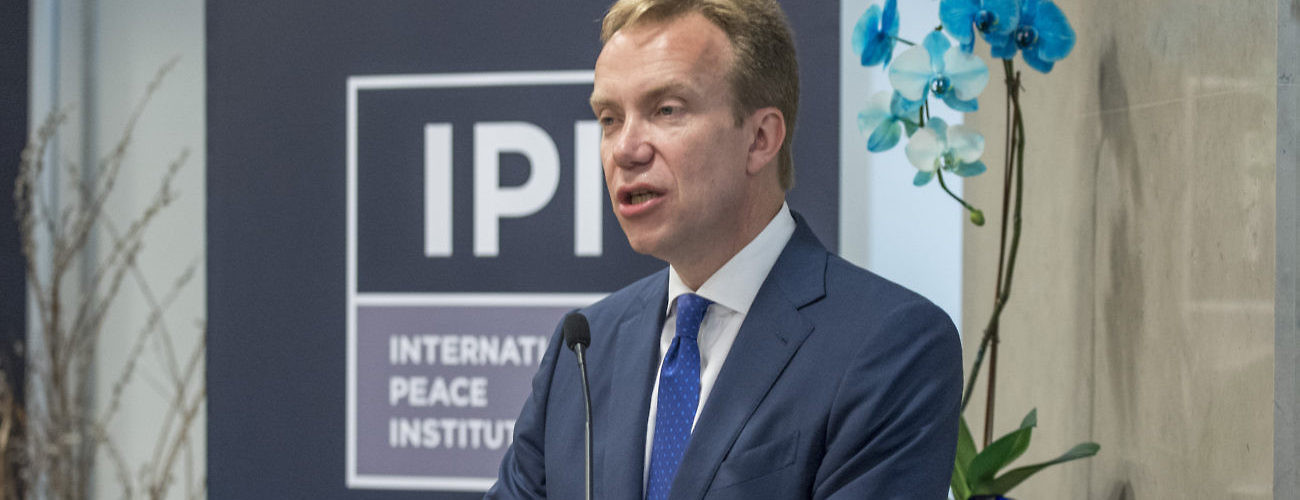With increasing attention being paid to the contest for who will become the next UN secretary-general, a September 22nd event co-sponsored by IPI and the Norwegian Ministry of Foreign Affairs focused instead on what that person should do once he or she is in the job.
The event was the annual Trygve Lie Symposium, and it showcased a joint initiative by Colombia, Ethiopia, Ghana, Indonesia, Jordan, Mexico and Norway that lays out the parameters of what the agenda of the new UN leader ought to be.
“We need a strong, determined SG, and a stronger and more agile UN,” said Børge Brende, the Norwegian Minister of Foreign Affairs, leading off a panel of ministers from the seven countries. “If you read the UN Charter today, it is as crisp and relevant as ever; it just needs to be used and in a proactive manner.”
The proposal, called UN 70, sets out five broad objectives for the new UN leader:
- Exercise strong and impartial leadership and show independence, accountability, efficiency and integrity as a manager
- Place conflict prevention at the heart of the UN’s peace and security agenda
- Push to implement Agenda 2030, the Addis Ababa Action Agenda and the Paris Climate Agreement through advocacy, coherent UN support and deeper partnerships
- Adopt new approaches to effectively respond to humanitarian needs, while strengthening prevention, protection and resilience
- Advocate for respect for human rights for all and reduce the implementation gap
Mr. Brende said the sponsors would seek out an early meeting with the secretary-general elect and would over the years become a sounding board “in making sure that she or he will be successful in this job.”
Indonesian Foreign Minister Retno Marsudi called for a secretary-general who would be “more functional” and “more democratic.” She added, “We have to convey to the new SG the need of narrowing the gap between what is discussed at the UN Headquarters and what materializes on the ground. We witness so many resolutions, so many discussions, but we rarely observe the implementation of these resolutions.”
Nasser Judeh, the Foreign Minister of Jordan, hailed the initiative for being from the inside, not the outside. “The UN has to reform itself from within,” he said. “It’s important that we have initiatives from within to reform and rejuvenate.”
He said that his region in particular wanted a secretary-general dedicated to finding a way to play a significant role in the Israeli-Palestinian dispute. “Nobody can look anybody in the face if we have yet another SG for another five years without doing anything about Palestine,” he said.
Hanna Tetteh, the foreign minister of Ghana, lauded the initiative for singling out the challenge of development, saying, “That’s part of the reason why the focus on the 2030 Agenda, and the implementation of the SDGs and Paris Agreement concurrently are critical.”
Foreign Minister Tedros Adhanom Ghebreyesus of Ethiopia said the initiative was a “message that we care about the UN and we care about the priorities of the next SG.”
Colombia’s Vice Minister for Multilateral Affairs Francisco Echeverri stressed the new secretary-general’s need to build on political leadership. “Let me stress that Colombia strongly believes in preventative diplomacy, mediation, peacebuilding and the UN’s conflict resolution capacities,” he said. “As a country emerging from a conflict through a peace process, we understand the importance of international support as a complement to national efforts, especially to restore confidence and prevent the recurrence of conflicts.”
Miguel Ruiz Cabañas, the Vice Minister of Foreign Affairs of Mexico, noted that the secretary-general is neither a chairman of the board nor a president but rather the more limited leader of the secretariat, which he described as one of the “organs” of the UN. “This person has to coordinate with other leaders and secretaries of international organizations,” he said. “We want her to be a person capable of interacting with other heads of international organizations.”
The emphasis on prevention was cited as a key accomplishment of the initiative by William Pace, Executive Director of the World Federalist Movement – Institute for Global Policy. “For 70 years, 99% of what has been called ‘prevention’ at the UN has been catastrophic conflict reaction, way too late, way unsuccessful,” he said.” If the SG is going to have a mandate to implement genuine prevention, she or he will need the strongest support of the member states.”
Sarah Cliffe, Director of New York University’s Center on International Cooperation, commented that “what is exciting about these recommendations is that they convey a great example of the balance between a principled and progressive stance on what the UN needs to do to face the challenges, with what is politically feasible.”
IPI President Terje Rød-Larsen made welcoming remarks, and the event was moderated by Pamela Falk, UN Resident Correspondent, CBS News TV & Radio.








